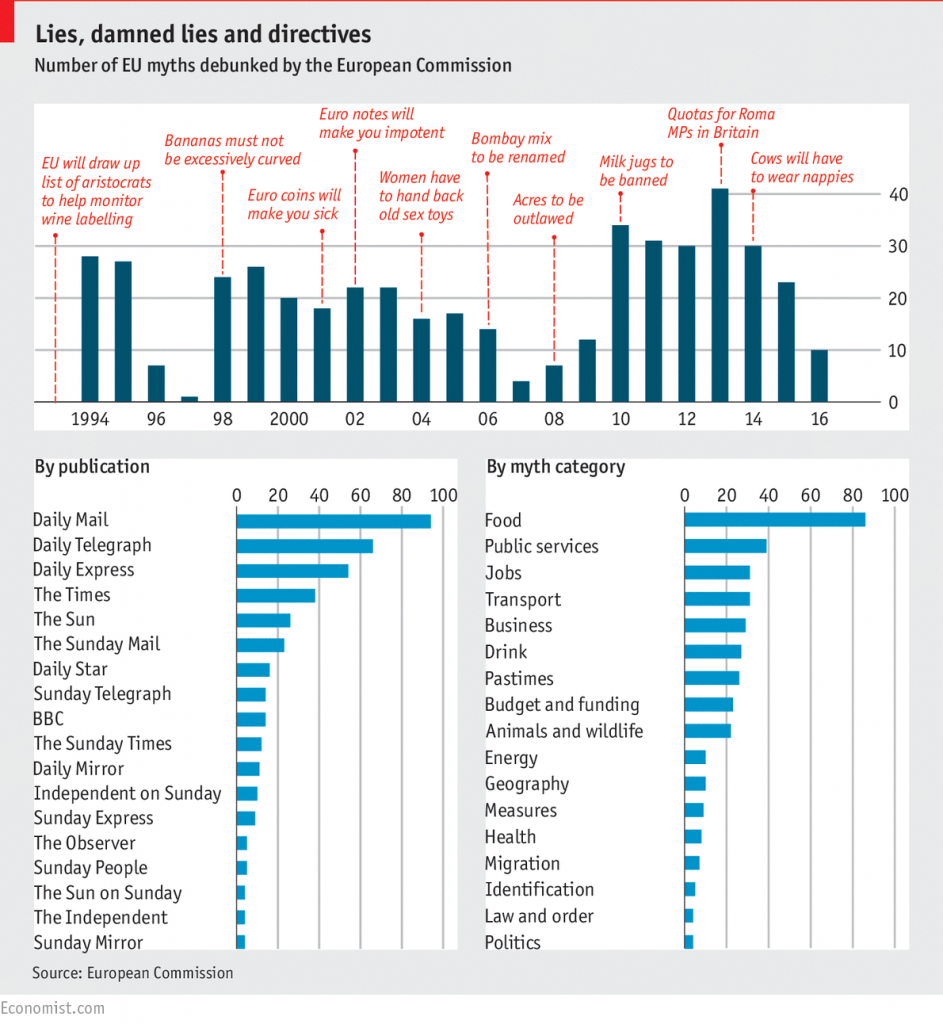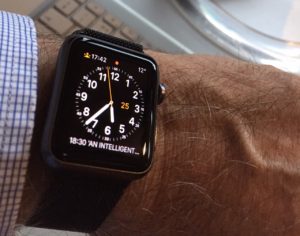We’ve been in Berlin for a few days. Walking along a residential street in Prenzlauer Berg I came on these brass squares outside the door of an apartment block and suddenly realised what they were: Stolperstine, literally “stumbling stones”, memorials to people, mainly Jews, who once lived in that building and who were deported and murdered by the Nazis. These three commemorate the Holzmann family — father Fritz, mother Dora and son Gerhard — who were all deported on the same day, 29 October, 1941. Father and son went to a forced labour camp and were murdered within a month of one another in 1943. Dora was murdered in another camp in May 1942. According to Wikipedia, over 50,000 stolpersteine have been laid in 18 European countries, making the stolperstein project the world’s largest decentralised memorial.
Monthly Archives: October 2016
Why the Web is making high-quality journalism unsustainable
From Frederic Filloux:
Today, the economic value of a journalism item stems from its popularity, i.e. the number of clicks (or views) it generates. A well-crafted listicle put together by a clever Millennial will generate more revenue that any public-interest piece, this in total disregard for who actually reads it, for how long, etc. That’s the absurdity of today’s system.
Yep. Insightful piece, well worth reading in full.
Apple mania
This morning’s Observer column:
It’s that time of year again. Apple has released its results for the fiscal quarter ended 24 September 2016 and we are immediately plunged into “Has Apple peaked?” speculation. How come? Well, the company posted quarterly revenue of $46.9bn and net income of $9bn. Not bad, eh? Ah, yes, but not if you’re a Wall Street analyst, because these numbers compare to revenue of $51.5bn and net income of $11.1bn in the same quarter the year before. And – shock, horror! – the company’s gross margin was only 38% compared to 39.9% a year ago. The numbers are down, in other words.
Cue fevered speculation about the fate of the company. The numbers, burbled one analyst, show “the danger of being a one-trick pony when everyone already owns a pony. The company’s reliance on the smartphone, which is now a mature and saturated market in the developed world, is starting to create a growth problem for Apple. Breaking through will be a challenge, reminding investors Apple’s fundamentals and stock price have peaked.”
Pause for a reality check: Apple has cash reserves of $237.6bn, up $32bn from last year. At $622bn (at 26 October 2016), it is the most valuable company in the world…
Euromyths in a post-truth culture
Apple’s iWatch in iDecline?
From Statista:
According to IDC’s most recent data, Apple Watch shipments declined by 71.6 percent in the past quarter compared to the same period last year. It’s the second consecutive quarter of high double-digit sales declines for Apple’s smartwatch, indicating that demand is quickly fading after a decent start. As our chart illustrates, the Apple Watch’s early sales figures were as good as the iPad’s and much better than the iPhone’s were in 2007. However, it took the iPhone nine years and the iPad three years to see their first year-over-year sales decline. Apple Watch sales started going downhill after just one year on the market.
Frankly, I’m not surprised. Although I continue to wear my Apple watch most days (especially on busy days when I’m expecting urgent emails or messages), I find it more or less useless for everything else. I’ve given up bringing it with me on overnight trips — can’t be bothered lugging a charger and cable. And of course at home it sits in its charging dock every night. Leading-edge uselessness, methinks.
The amnesia of post-Watergate liberals
There’s a fine essay in The Atlantic by Matt Stoller on how post-Watergate liberals forgot about the menace of corporate power.
For most Americans, the institutions that touch their lives are unreachable. Americans get broadband through Comcast, their internet through Google, their seeds and chemicals through Monsanto. They sell their grain through Cargill and buy everything from books to lawnmowers through Amazon. Open markets are gone, replaced by a handful of corporate giants. Political groups associated with Koch Industries have a larger budget than either political party, and there is no faith in what was once the most democratically responsive part of government: Congress. Steeped in centralized power and mistrust, Americans must now confront Donald Trump, the loudest and most grotesque symbol of authoritarianism in politics today.
“This,” wrote Robert Kagan in The Washington Post, “is how fascism comes to America.” The nation is awash in commentary and fear over the current cultural moment. “America is a breeding ground for tyranny,” wrote Andrew Sullivan in New York magazine. Yet, Trump’s emergence would not be a surprise to someone like Patman, or to most New Dealers. They would note that the real-estate mogul’s authoritarianism is not new in American culture; it is ubiquitous. It is consistent with how the commercial sphere has developed since the 1970s. Americans feel a lack of control: They are at the mercy of distant forces, their livelihoods dependent on the arbitrary whims of power. [Wright] Patman once attacked chain stores as un-American, saying, “We, the American people, want no part of monopolistic dictatorship in … American business.” Having yielded to monopolies in business, the nation must now face the un-American threat to democracy Patman warned they would sow.
Great essay. It chimes with a book I’m reading at the moment — Thomas Frank’s Listen Liberal: or whatever happened to the party of the people? — which is about how the Democrats came to represent certain kinds of elites rather than real people. And which of course is also about why Hillary Clinton is such a depressing candidate for president.
It reminds us also that
[Bill] Clinton stripped antitrust out of the Democratic platform; it was the first time a reference to monopoly power was not in the platform since 1880.
What the Trump ascendancy means
Good summary by Mark Danner in the New York Review of Books:
Is Donald J. Trump really what the whole long age was gradually making for and meaning? That a reality television star and businessman con artist devoid of public office experience and proudly ignorant of public policy, of braggadocious and offensive and unstable character, given to the most bald-faced race-baiting and misogyny and demagoguery, could nonetheless be elected by our fellow citizens president of the United States?
It should be observed that this is not a question that will be answered by the election itself. If Donald J. Trump is not elected president of the United States on November 8, we will owe this not to some triumph of the superior American system or to the eloquent presentation of a progressive alternative but to the fact that this singularly offensive man offended too many voters, especially white, college-educated women. It will not be because he was rendered unelectable by virtue of his lies and race-baiting and immigrant-bashing and demagoguery.
On the contrary. Trump embodies grisly aspects of our politics that are not new but that, on him, are starkly illuminated. What are these? That much of our politics in this increasingly diverse country pivots on the hateful fulcrum of race, of racial fear and xenophobia and antagonism toward the Other, and that this has only grown in power and ugliness since the rise of Barack Obama and his coalition. That in vital matters of gender and sexuality and marriage much of the politics of the presiding culture is furiously rejected by a significant minority of the country as a “politically correct” and immoral imposition. That in the aftermath of a severe economic crisis—and after decades of economic stagnation for most Americans—tens of millions of voters feel so abandoned by the system that they offer their full-throated cheers to a candidate pledging to wholly dismantle it and put “in jail” his opponent. That the electoral system as it has evolved over that time and especially in the wake of such decisions as Citizens United has become starkly, shabbily, and spectacularly corrupt. And finally that entertainment and money in the grossest sense play a far more important part in our politics than any attention to public policy, and that the commercial press, particularly the broadcast press, battens on that reality to an increasingly shameless degree.
Brought down by a toaster?
As readers of my stuff will know (see here and here, for example), I’ve been going on about the existential risk pose by the ‘internet of things’ for a while, so I’m loath to keep on about it. But this nice encapsulation of the problem by Ben Evans seems well worth quoting:
A chunk of the internet went down this week, effectively, because someone did a massive distributed denial-of-service attack using a botnet of millions of hacked IoT devices – mostly, it seems, IP webcams from one Chinese company that don’t have decent security. This is an interesting structural problem – the devices once sold are either impossible or unlikely to be patched, the users probably don’t even know that their device is hacked, and the manufacturer has no motivation and probably few of the necessary skills to do anything about it. A network designed to withstand nuclear attack, brought down by toasters. More interesting/worrying – who is doing this, why, and what will they do next?
How your shower could participate in a DDOS attack
This morning’s Observer column:
My eye was caught by a Kickstarter campaign for a gizmo called a SWON, described as “a connected conservation device for your shower”. You unscrew the shower head, screw on the SWON and then screw the head back on to it. From then on, water goes through the SWON before it reaches you. The Kickstarter campaign needs $50,000 to be pledged before the product can be made. Last time I checked, it had 75 backers and had raised pledges of $4,798.
Before consigning it to the “leading-edge uselessness” bin, I clicked on the link…
Come for a drive in a Tesla
Tesla says that the necessary kit for fully-autonomous driving will be installed on all its new cars from now on. But it won’t be activated until a lot more testing has been done. This video provides a glimpse of this brave new future. Ignore the music.



